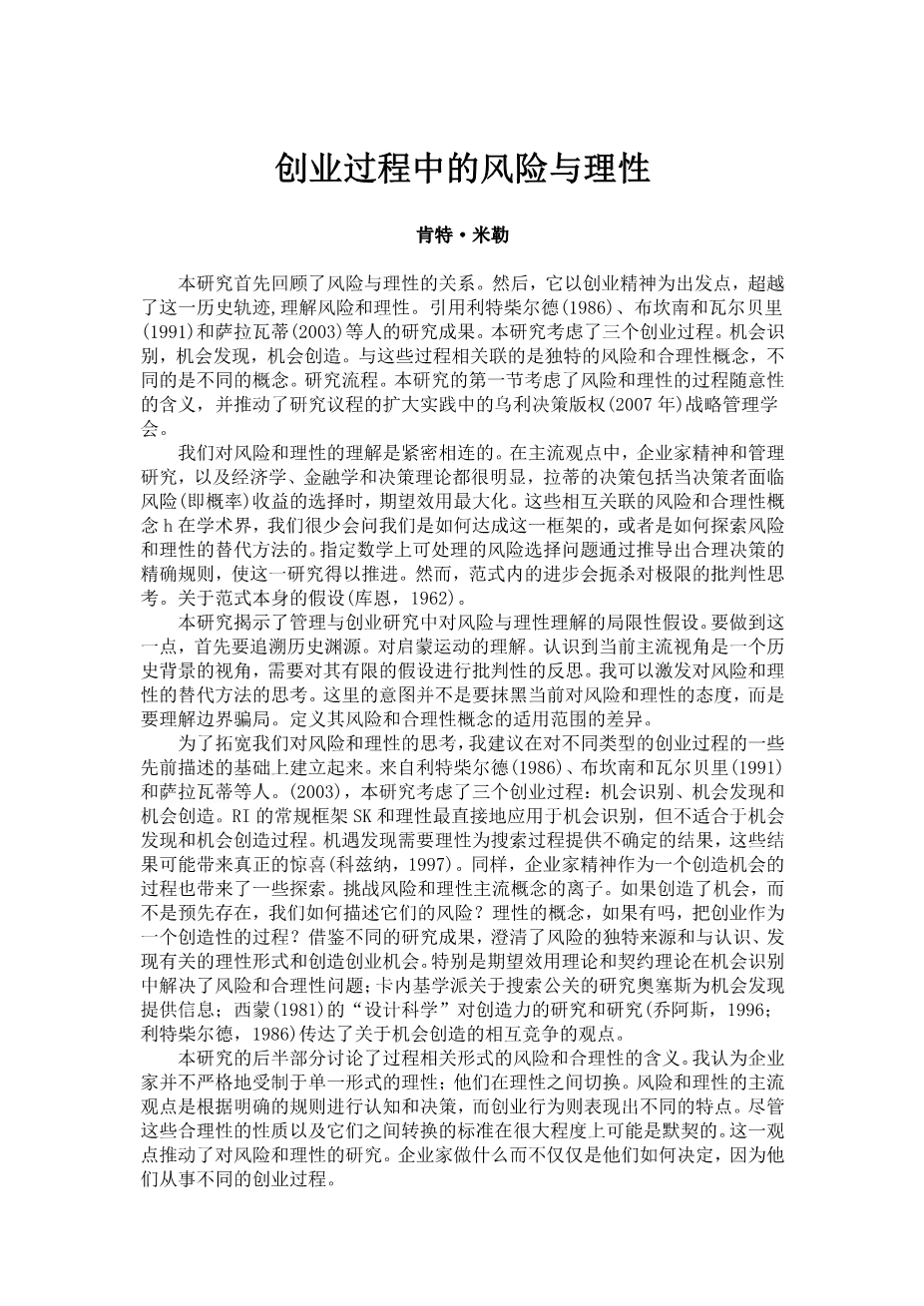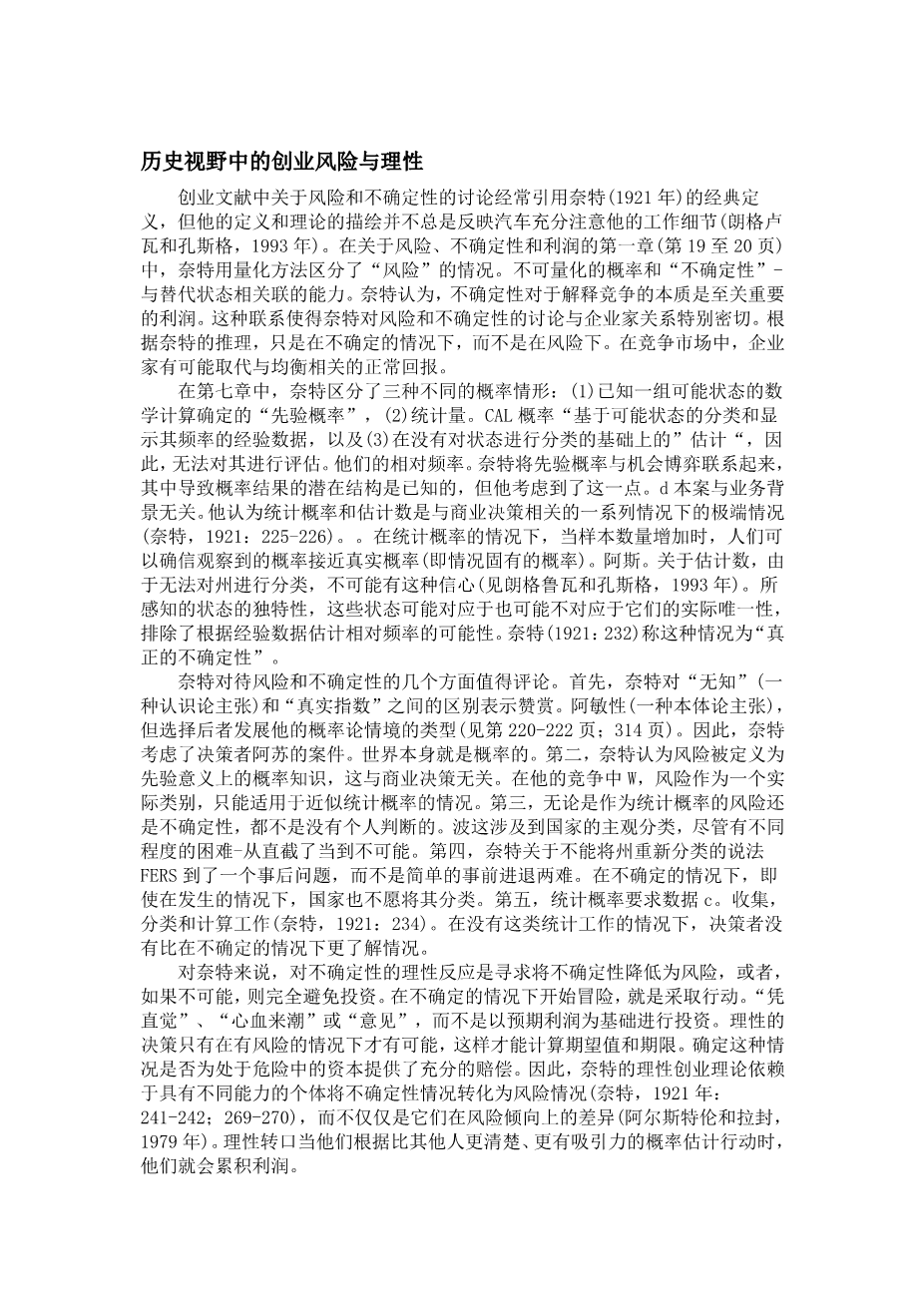RISK AND RATIONALITY IN ENTREPRENEURIAL PROCESSES
KENT D. MILLER
The Eli Broad Graduate School of Management, Michigan State University East Lansing, Michigan, U.S.A.
Our This study begins with a historical overview of the connection between risk and rationality. It then broadens beyond this historical trajectory by taking entrepreneurship as a point of departure for understanding risk and rationality. Drawing from the research of Littlechild (1986), Buchanan and Vanberg (1991), and Sarasvathy et al. (2003), this study considers three entrepreneurial processes: opportunity recognition, opportunity discovery,and opportunity creation. Associated with each of these processes are unique conceptualizations of risk and rationality, refl ected in distinct research streams. The fi nal section of the study considers implications of the process-contingent nature of risk and rationality, and motivates a broadening of the research agenda from entrepreneurial decision making to practices. Copyright © 2007 Strategic Management Society.
understandings of risk and rationality are closely connected. In the prevailing view, evident in entrepreneurship and management research, as well as economics, finance, and decision theory, rational decision making consists of maximizing expected utility when decision makers face choices with risky (i.e., probabilistic) payoffs. These interrelated conceptualizations of risk and rationality have such taken-for-granted status among academics that we rarely ask how we arrived at this framing or explore alternative approaches to risk and rationality. Specifying mathematically tractable risky choice problems has allowed this line of research to advance by deriving precise rules for rational decision making. However, progress within a paradigm can stifle critical reflection about the limiting assumptions of the paradigm itself (Kuhn, 1962).
This study exposes the limiting assumptions of the understandings of risk and rationality reflected in management and entrepreneurship research. To do so, it begins by tracing the historical origins of these understandings to the Enlightenment. Under- standing that the current mainstream perspective is a historically situated perspective invites critical reflection on its limiting assumptions, which can stimulate thinking about alternative approaches to risk and rationality. The intent here is not to discredit the prevailing approach to risk and rationality, but to understand the boundary conditions that define where its conceptualizations of risk and rationality apply.
To broaden our thinking about risk and rationality, I propose to build upon some prior descriptions of different kinds of entrepreneurial processes. Drawing from Littlechild (1986), Buchanan and Vanberg (1991), and Sarasvathy et al. (2003), this study considers three entrepreneurial processes: opportunity recognition, opportunity discovery, and opportunity creation. The conventional framing of risk and rationality applies most directly to opportunity recognition, but is ill-suited for opportunity discovery and opportunity creation processes. Opportunity discovery calls for a rationality that informs search processes with indeterminate outcomes that present the potential for genuine surprises (Kirzner, 1997). Likewise, entrepreneurship as a process of opportunity creation raises some questions that challenge the mainstream conceptualizations of risk and rationality. If opportunities are created, rather than preexistent, how do we characterize their risk? What concept of rationality, if any, applies to entrepreneurship as a creative process? Drawing upon distinct streams of research clarifies the unique sources of risk and forms of rationality associated with recognizing, discovering, and creating entrepreneurial opportunities. In particular, expected utility theory and contract theory address risk and rationality in opportunity recognition; Carnegie School research on search processes informs opportunity discovery; Simon’s (1981) ‘science of design’ research and research on creativity (Joas, 1996; Littlechild, 1986) convey competing views of opportunity creation.
The latter portion of this study addresses the implications of process-contingent forms of risk and rationality. I argue that entrepreneurs are not strictly bound to a single form of rationality; instead, they switch among rationalities. Whereas the prevailing view of risk and rationality privileges cognition and decision making according to explicit rules, entrepreneurial action expresses various rationalities, even though the nature of these rationalities and the criteria for switching among them may be largely tacit. This view motivates research examining risk and rationalities as reflected in what entrepreneurs do, not just how they decide, as they engage in distinct entrepreneurial processes.
ENTREPRENEURIAL RISK AND RATIONALITY IN HISTORICAL PERSPECTIVE
Discussions of risk and uncertainty in the entrepreneurship literature frequently reference Knight’s (1921) classic definitions, yet portrayals of his definitions and theory do not always reflect careful attention to the details of his work (Langlois and Cosgel, 1993). In the opening chapter of Risk, Uncertainty, and Profit (pages 19–20), Knight distinguished between cases of ‘risk,’ with quantifiable probabilities, and ‘uncertainty,’ with nonquantifiable prob- abilities associated with alternative states. Knight argued that uncertainty was essential to explaining the nature of competition and profit. This connection makes Knight’s discussion of risk and uncertainty particularly germane to the field of entrepreneur- ship. By Knight’s reasoning, only under uncertainty, rather than risk, can it be possible for entrepreneurs to supersede the normal returns associated with equilibrium in competitive markets
剩余内容已隐藏,支付完成后下载完整资料


英语译文共 14 页,剩余内容已隐藏,支付完成后下载完整资料
资料编号:[449050],资料为PDF文档或Word文档,PDF文档可免费转换为Word
您可能感兴趣的文章
- 薪酬满意度作为工作满意度的先行因素:建立一个回归模型,确定公共和私人组织中薪酬满意度与工作满意度之间的线性关系外文翻译资料
- 胜任力与胜任力、胜任力模型与胜任力模型的比较研究外文翻译资料
- 如何提高企业网络招聘的有效性外文翻译资料
- 为初级职位招聘大学生,在制定战略和战术校园招聘计划时,需要考虑哪些问题?外文翻译资料
- 基于能力的招聘:招聘和留住成功员工的关键外文翻译资料
- 员工培训对体育门票销售人员工作满意度的影响外文翻译资料
- 由雇主参与的创新型员工激励模式外文翻译资料
- 浅析企业文化与企业绩效的相关性 ——以苏州金色未来信息咨询股份有限公司为例外文翻译资料
- 互联网背景下基于平衡计分卡的计算机绩效评价系统外文翻译资料
- 提高斯洛伐克公共行政部门招聘过程的效率外文翻译资料


